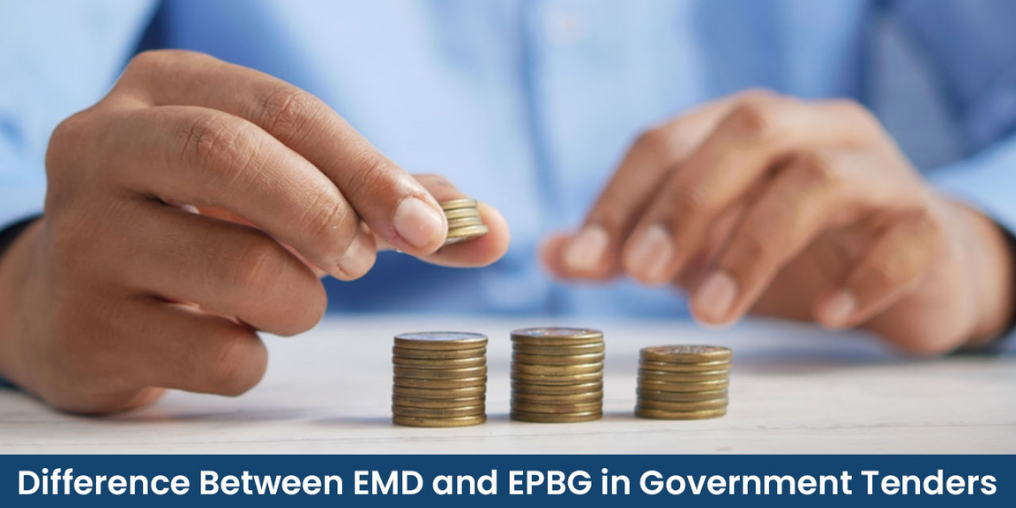Difference between EMD and EPBG in Government Tenders

When participating in government tenders, two commonly encountered financial instruments are EMD (Earnest Money Deposit) and EPBG (Earnest Performance Bank Guarantee). Understanding the difference between the two is crucial for suppliers, contractors, and service providers to ensure compliance and reduce risks while bidding.
In this blog, we’ll explore the meaning, purpose, and key differences between EMD and EPBG.
What is EMD (Earnest Money Deposit)?
EMD, or Earnest Money Deposit, is a security deposit submitted by bidders while applying for a tender. It serves as a commitment that the bidder is serious and willing to execute the contract if awarded.
Key Points:
- Usually 2% to 5% of the estimated tender value.
- Submitted before bid submission.
-
Can be paid via:
- Bank Guarantee
- Demand Draft
- Online transfer (in GeM, CPPP, etc.)
- Refundable to unsuccessful bidders.
- Forfeited if the winning bidder backs out or fails to sign the contract.
What is EPBG (Earnest Performance Bank Guarantee)?
EPBG, also known as Performance Security or Performance Bank Guarantee, is a guarantee provided by the successful bidder after the award of the contract. It assures the buyer that the vendor will fulfill the contractual obligations.
Key Points:
- Usually 3% to 10% of the contract value.
- Submitted after tender is awarded, before work begins.
- Valid for the duration of the contract (sometimes including a warranty period).
- Forfeited if the vendor fails to perform or violates contract terms.
- Often issued as a Bank Guarantee.
Key Differences between EMD and EPBG
Feature: Purpose
- EMD (Earnest Money Deposit): Ensures bidder’s seriousness
- EPBG (Earnest Performance Bank Guarantee): Ensures contractor’s performance
Feature: When Required
- EMD (Earnest Money Deposit): At the time of bid submission
- EPBG (Earnest Performance Bank Guarantee): After the contract is awarded
Feature: Refundable
- EMD (Earnest Money Deposit): Yes, if not selected or on contract signing
- EPBG (Earnest Performance Bank Guarantee): Yes, after completion of contract
Feature: Amount
- EMD (Earnest Money Deposit): 2%–5% of estimated cost
- EPBG (Earnest Performance Bank Guarantee): 3%–10% of awarded contract value
Feature: Mode of Submission
- EMD (Earnest Money Deposit): DD, BG, or online
- EPBG (Earnest Performance Bank Guarantee): Bank Guarantee only (usually)
Feature: Forfeiture Conditions
- EMD (Earnest Money Deposit): If bidder backs out or misrepresents
- EPBG (Earnest Performance Bank Guarantee): If contractor fails to perform or defaults
Are There Any Exemptions?
Yes. As per government guidelines:
- MSMEs registered with NSIC or UDYAM may be exempted from paying EMD.
- EPBG may still be required, even if EMD is waived.
Always check the specific tender document for exemption eligibility and documentation requirements.
Conclusion
Both EMD and EPBG are critical financial instruments in the tendering process. While EMD protects the buyer during bidding, EPBG protects them during execution. Understanding their roles and differences helps vendors stay compliant, avoid penalties, and build trust with government buyers.
If you’re new to tendering or need assistance in managing your bids, our expert team at Classic Tenders is here to help!
Classic Tenders Private Limited (CTPL) is India’s most trusted tender bidding services provider and expert consultancy.
Our core mission is to empower MSMEs, startups, manufacturers, traders, and enterprises across India to confidently navigate the complexities of online government tender bidding and e-procurement processes.
As a leading tender bidding company and e-procurement tender consultant, we provide online tender bidding support with Whether you're bidding for local, state, or central tenders, CTPL ensures your success with full-spectrum tender bidding consultancy.
 By Admin
By Admin

